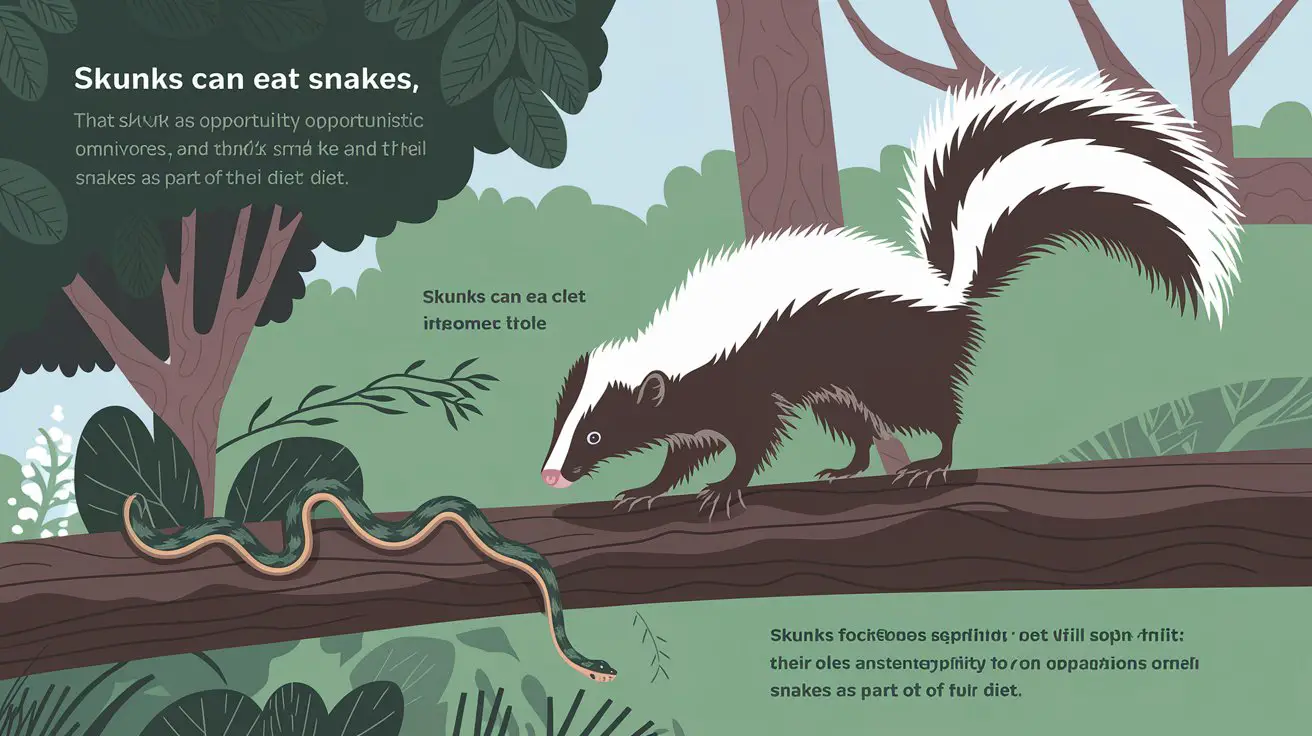Can Skunks Eat Snakes? A Skunk Owner’s Guide
As a skunk owner and wildlife enthusiast, I’ve often been asked, “Can skunks eat snakes?” The answer is a resounding yes! These adaptable omnivores are known for their opportunistic feeding habits, which sometimes include snakes. Skunks may not actively hunt snakes, but they are equipped to handle these slithery creatures when the opportunity arises. In this article, we’ll explore the relationship between skunks and snakes, their diet, and the fascinating ecological roles they play.
The Skunk Diet: A Versatile Palate
Skunks are omnivores, meaning their diet consists of both plant and animal matter. Their flexibility in food choices allows them to survive in various habitats, from dense forests to suburban backyards. Here’s an overview of what skunks typically eat:
Primary Food Sources
- Insects: Beetles, crickets, grasshoppers, and grubs.
- Small Mammals: Mice, voles, and shrews.
- Birds and Eggs: Ground-nesting birds and their eggs.
- Fruits and Plants: Berries, nuts, and leaves.
- Reptiles and Amphibians: Frogs, lizards, and snakes.
Can Skunks Eat Snakes?
Yes, skunks can and do eat snakes. While they are not specialized snake hunters, their opportunistic nature allows them to prey on snakes when the conditions are right. Skunks are even known to consume venomous snakes, thanks to their impressive resistance to certain snake venoms.
Why Skunks Eat Snakes
- Nutritional Value: Snakes are a good source of protein and fat, essential for skunks’ energy needs.
- Opportunistic Behavior: Skunks may stumble upon snakes while foraging for other prey.
- Predator-Prey Interaction: A slow or injured snake becomes easy prey for a skunk.
Skunks and Venomous Snakes
One of the most fascinating aspects of skunks is their resistance to venom. Studies show that skunks have a high tolerance for venom from species like rattlesnakes. This allows them to prey on venomous snakes without significant risk, making them a natural predator for these reptiles.
How Skunks Handle Venomous Snakes
- Thick Fur: Acts as a barrier against snake bites.
- Quick Reflexes: Skunks use their sharp claws to pin snakes and avoid direct bites.
- Venom Resistance: Skunks’ unique biology reduces the effects of snake venom.
Skunks’ Hunting Techniques
Skunks are not agile hunters like cats, but they have their own effective methods for catching prey, including snakes. Their hunting strategies rely on patience, stealth, and their physical attributes.
Key Hunting Strategies
- Keen Sense of Smell: Skunks use their excellent sense of smell to locate snakes hidden in vegetation or burrows.
- Digging Skills: With strong claws, skunks can unearth snakes from their hiding spots.
- Surprise Attacks: Skunks may pounce on unsuspecting snakes, using their claws and teeth to subdue them.
Ecological Role of Skunks Eating Snakes
Skunks play an essential role in ecosystems, and their occasional predation on snakes helps maintain ecological balance. By consuming snakes, skunks contribute to:
- Controlling Snake Populations: Preventing overpopulation of certain snake species.
- Regulating Ecosystems: Balancing prey and predator dynamics in their habitat.
- Reducing Venomous Snake Threats: Their ability to eat venomous snakes can indirectly protect other animals and even humans.
Skunk-Snake Interactions: Real-Life Scenarios
Wildlife observations have documented various interactions between skunks and snakes. These encounters are more common in habitats where both species coexist, such as grasslands, woodlands, and deserts.
Documented Encounters
- Foraging in Snake Habitats: Skunks searching for insects or small rodents may stumble upon snakes.
- Raiding Nests: Skunks occasionally consume snake eggs or young hatchlings.
- Defense and Opportunism: A snake that crosses a skunk’s path may become a meal, especially if it appears weak or sluggish.
How to Manage Skunks and Snakes in Your Area
If you’re a homeowner or gardener, you might wonder how to coexist with both skunks and snakes without conflict. Here are some tips:
Encouraging Natural Pest Control
- Welcome Skunks: Their predation on venomous snakes can reduce risks around your property.
- Limit Food Waste: Avoid leaving pet food or garbage accessible to skunks, encouraging them to focus on natural prey.
Minimizing Unwanted Encounters
- Secure Trash: Use bins with tight-fitting lids to deter skunks.
- Maintain Landscaping: Remove tall grass and woodpiles where snakes and skunks might hide.
- Use Repellents: Apply natural deterrents like citrus or ammonia to areas prone to skunk activity.
Frequently Asked Questions
Do Skunks Actively Hunt Snakes?
Skunks don’t typically hunt snakes but will eat them if they come across one, especially if the snake is slow-moving or injured.
Are Skunks Immune to All Snake Venom?
Skunks have a high resistance to certain snake venoms, such as rattlesnake venom, but they are not entirely immune to all venoms.
Do Skunks Eat Snake Eggs?
Yes, skunks may raid nests to eat snake eggs, as they are an easy and nutritious food source.
Conclusion
Skunks are fascinating creatures with a diet as varied as their habitats. While snakes are not a primary food source, skunks can and do eat them when the opportunity arises. Their remarkable resistance to venom and opportunistic foraging behavior make them unique predators in the animal kingdom. By understanding the relationship between skunks and snakes, we can better appreciate the roles these animals play in maintaining ecological balance.

